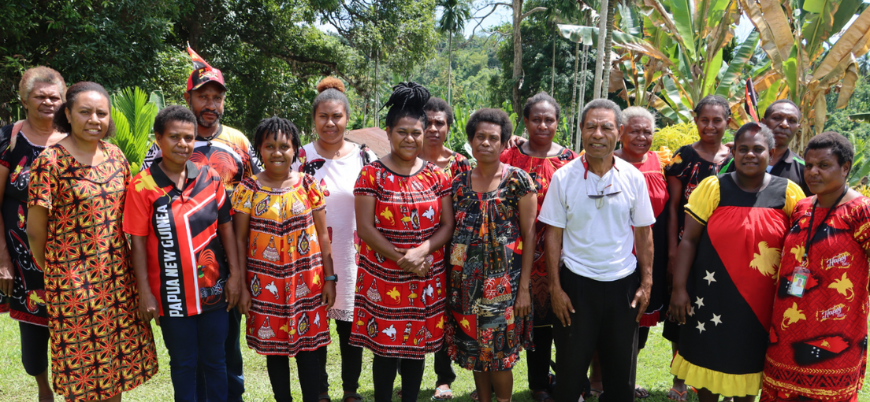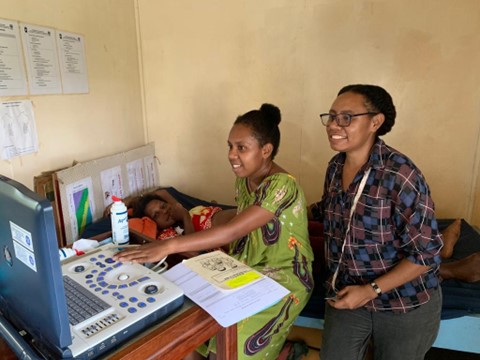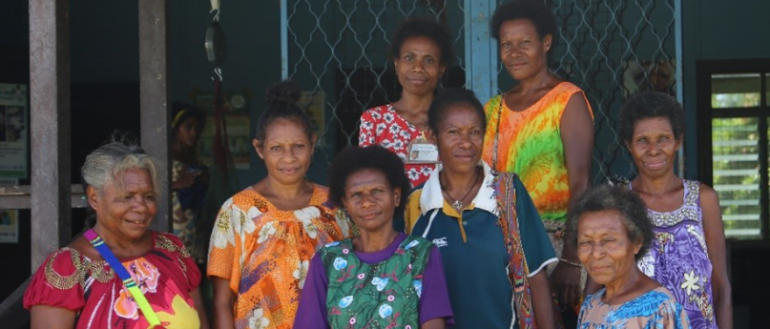Image 1: SAPOT Community liaison officer and Community reporters at Mugil Health Centre, Madang Province, PNG.
The first 40 babies from mothers enrolled in an award-winning malaria prevention project in Papua New Guinea (PNG) have been born.
The 4-year ‘Sulfadoxine-pyrimethamine Plus Dihydroartemisinin-piperaquine for Intermittent Preventive Treatment in Pregnancy (SAPOT)’ study began recruiting pregnant mothers in September 2022 with the first of those babies being born now.
Around 400 mothers from around the country have joined up to take part in the SAPOT clinical trial and the follow-up infant study, which brings together Menzies School of Health Research (Menzies) and the Papua New Guinea Institute of Medical Research.


Menzies Senior Research Fellow, Dr Holger Unger, said uptake for the first part of the trial was excellent – thanks to the dedicated work of local community reporters visiting remote villages to engage pregnant women in the study.
“They have done an incredible job, going out to all the villages, little hamlets and bush areas spreading the word about the study and encouraging pregnant women to take part,” said Dr Unger, who is the study’s chief investigator.
“Without their dedication and commitment we wouldn’t have had such a good uptake. It’s a great result.”
“Tribute needs to be paid to Dr Alice Mengi and Dr Paula Tesine, our trial clinicians, in PNG, and their wonderful team of midwives, nurses, drivers, laboratory staff, administration officers and data officers.”

Image 2: The SAPOT trial team in Madang on PNG Independence Day. Photo credit: Barry Peter
Funded by the Australian Government’s National Health and Medical Research Council (NHMRC), researchers are examining how to better prevent malaria in pregnancy. The trial is testing whether addition of the artemisinin-based combination treatment dihydroartemisinin-piperaquine (DP) to standard malaria prevention (sulphadoxine-pyrimethamine - SP) provides better malaria protection during pregnancy and reduces adverse pregnancy outcomes such as stillbirth and low birth weight.
The AU$3 million provided by the NHMRC helps researchers look at the impact of using 2 types of anti-malarial drugs each month on mothers, and the impact on their babies up to 4-weeks-old. Last October, a follow-up SAPOT infant study was awarded additional funding by the prestigious Thrasher Research Fund, a US-based philanthropic organisation which provides medical research grants to improve the lives of children worldwide.
The funds will enable teams of researchers in Australia and Papua New Guinea to measure the long-term benefits of this approach by following the children up until they are 12-months-old. The SAPOT Infant study is designed to test the theory that better prevention of malaria in pregnancy can be achieved by giving mothers SP and DP each month to reduce the risk of adverse health outcomes during the first year of life, compared to using SP alone.
“This is to determine whether improving malaria control in pregnancy could also lead to better infant health outcomes,” said Dr Unger.
Dr Unger said the World Health Organization (WHO) endorses monthly intermittent preventative treatment in pregnancy (IPTp) with the drug sulfadoxine-pyrimethamine (SP).
“This strategy is used in 35 countries around the globe. The issue is that due to high-grade resistance, SP is failing as an anti-malarial. Despite this, SP remains potent at preventing adverse pregnancy outcomes through non-malarial mechanisms,” he said.
“A second drug, dihydroartemisinin-piperaquine (DP) is a much better anti-malarial, but compared to SP, birthweights are lower.
“By combining the two, we hope to control malaria and deliver healthier babies who grow into healthier children.”
For more information about the research, head to: SAPOT Clinical Trial: Treatment in pregnancy to prevent malaria - Menzies

Image 3: Dr Paula Tesine and Jacobeth Mase (RM) conduct a pregnancy scan at the Alexishafen Health Centre, Madang Province, PNG.

